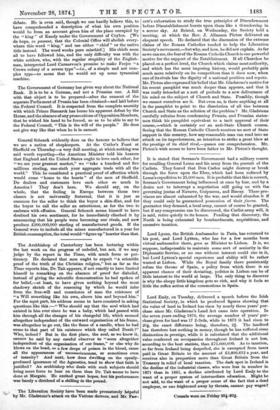cett's exhortation to study the true principles of Disendowment before
Disestablishment bursts upon them like a thunderclap in a serene sky. At Bristol, on Wednesday, the Society held a meeting, at which the Rev. J. Allanson Picton delivered an eloquent speech. He declared that the discussion of the extreme claims of the Roman Catholies tended to help the Liberation Society's movement,—but why, and how, he did not explain. As far aswe can see, the fear of the Roman Catholic Church is one powerful motive for the support of the Establishment If all Churches be placed on a perfect level, the Church which claims most authority, and which has the most imposing history, would probably gain much more relatively on its competitors than it does now, when one of its rivals has the dignity of a national position and repute. Mr. Picton also expressed his belief that Mr. Gladstone's motive for his recent pamphlet was much deeper than appears, and that it was really intended as a sort of prelude to a new deliverance of his mind on the subject of Church and State. Possibly, though we cannot ourselves see it. But even so, is there anything at all in the pamphlet to point to the dissolution of all ties between Church and State as the solution of the problem? Mr. Gladstone carefully refrains from condemning Prussia, and Prussian states- men think his pamphlet equivalent to a tacit approval of their course,—which is certainly not an anti-State Church course. Seeing that the Roman Catholic Church receives no sort of State support in this country, how any reasonable man can read into an attack on its imperiousness, an intention to strike a great blow at the prestige of its chief rival,—passes our comprehension. Mr. Picton's wish seems to have been father to Mr. Pioton's thought.






































 Previous page
Previous page